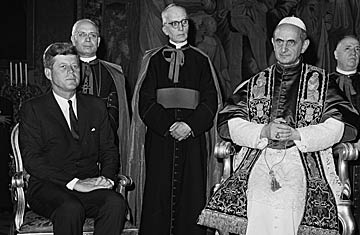
July 02, 1963: Pope Paul receives President John. F Kennedy in the Vatican City
"I not only don't believe in voicing prejudice," said President Eisenhower at his press conference last week, "I want to assure you that I feel none. And I am sure that Mr. Nixon feels exactly the same . . . Mr. Nixon and I agreed long ago that one thing we would never raise is the religious issue in this campaign . . . I would hope that religion could be one of those subjects that could be laid on the shelf and forgotten until after the election is over."
At the moment that the President was talking, 150 Protestant clergymen and laymen, calling themselves the Citizens for Religious Freedom, were meeting behind closed doors several blocks away in Washington's Mayflower Hotel. Their purpose: to dedicate themselves to the proposition that Jack Kennedy's Roman Catholicism would by no means be forgotten as an election issue. At the close of their session, they issued a 2,000-word manifesto that more than any other statement thus far in the campaign served to make religion the most emotional issue of the 1960 election.
The churchmen met privately, refused to list the names of those who attended.
But reporters quickly identified two prominent leaders:
¶ Dr. Daniel Poling, 75, editor of the influential Protestant monthly, Christian Herald (circ.: 427,000), unsuccessful Republican candidate for mayor of Philadelphia in 1951, and an antagonist of Jack Kennedy's since 1950. It was then that a building-fund dinner was held in Philadelphia for an interfaith chapel within the Grace Baptist Temple (Poling's pulpit from 1936 to 1948) to be dedicated to the memory of the four famed Army chaplains who went down with the troopship Dorchester in 1943—including Poling's own son, Lieut. Clark V. Poling. Congressman Kennedy accepted an invitation to speak, backed out at the last minute on advice from the Archdiocese of Philadelphia. Poling has never forgiven
Kennedy—and he has never let Protestants forget the incident.*
¶ Dr. Norman Vincent Peale, 62, a longstanding Republican whose Protestant following rivals Billy Graham's as the largest in the U.S. His nationally syndicated column, Confident Living, appears in 196 newspapers. His radio show, The Art of Living, is broadcast on some 60 NBC stations. His monthly magazine, Guideposts, reaches far and wide across the land. His church, Manhattan's Marble Collegiate, is filled to overflowing for each of his two Sunday sermons. He has sold more than 4,000,000 hard-covered copies of his books, e.g., The Power of Positive Thinking, A Guide to Confident Living.
Soft on Catholicism. Dr. Peale presided over the meeting, according to two eavesdropping reporters, John J. Lindsay of the Washington Post and Times-Herald and Bonnie Angelo of Long Island's Newsday. "Our American culture is at stake," said Peale. "I don't say it won't survive, but it won't be what it was."
